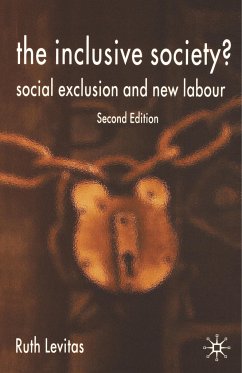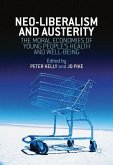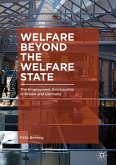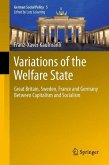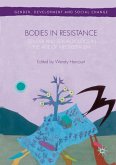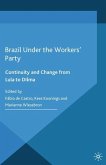The idea of social exclusion is part of the new political language. When Labour came into government in 1997, it launched the Social Exclusion Unit to pursue this central theme. But what exactly does social inclusion mean? This revised and updated edition of The Inclusive Society? identifies three competing meanings of the term in contemporary British Politics, emphasising poverty, employment and morality. Ruth Levitas argues that there has been a shift away from understanding social exclusion as primarily a problem of poverty, towards questions of social integration through paid work and moral regulation.
Praise for the First edition:
'This is a stunningly effective critique of some of New Labour's flannel. Ruth Levitas has provided a cool, analytical dissection of the subtle changes in approach towards poverty and social exclusion appearing in various influential documents of the 1990s...this book should make both politicians and sociologists squirm.' - Ray Pahl, The Sociological Review
'...this is a really good book - clear coherent, and plainly and intelligibly written.' - David Byrne, Work, Employment and Society
'This incisive and very readable account of the New Labour discourse and politics of social exclusion is both topical and thought-provoking. It reminds us that the cosy language of community, stakeholding and social inclusion can serve to obscure inequalities and fundamental conflicts of interest. It should be read not just by all those interested in the New Labour 'project' but, even more importantly, by those conducting it.' - Ruth Lister, Professor of Social Policy, Department of Social Sciences, Loughborough University
Endorsments for this edition:
'This is a provocative work that deserves to be read by a wide audience, including undergraduate and postgraduate students of politics, sociology and social policy, together with those seeking a sophisticated analysis of the New Labour project.' - Paul Higate, University of York
'This is a stunningly effective critique of some of New Labour's flannel. Ruth Levitas has provided a cool, analytical dissection of the subtle changes in approach towards poverty and social exclusion appearing in various influential documents of the 1990s...this book should make both politicians and sociologists squirm.' - Ray Pahl, The Sociological Review
'...this is a really good book - clear coherent, and plainly and intelligibly written.' - David Byrne, Work, Employment and Society
'This incisive and very readable account of the New Labour discourse and politics of social exclusion is both topical and thought-provoking. It reminds us that the cosy language of community, stakeholding and social inclusion can serve to obscure inequalities and fundamental conflicts of interest. It should be read not just by all those interested in the New Labour 'project' but, even more importantly, by those conducting it.' - Ruth Lister, Professor of Social Policy, Department of Social Sciences, Loughborough University
Endorsments for this edition:
'This is a provocative work that deserves to be read by a wide audience, including undergraduate and postgraduate students of politics, sociology and social policy, together with those seeking a sophisticated analysis of the New Labour project.' - Paul Higate, University of York

